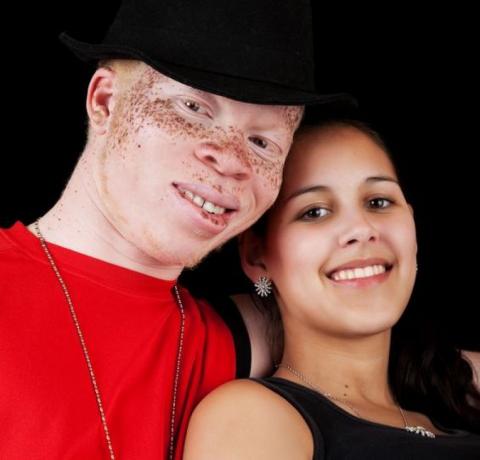I should be over it by now; but I am not. I thought I was, but seeing
her little “goldilocks” pigtails, dimpled cheeks and oval glasses
triggered something I did not even know still resided within me. I
caught myself smiling at the little toddler with albinism, cuddly in
stature and just downright adorable. The hot South African sun reflected
her golden locks as she happily skipped on the walk-way. That was until
she tried to cross the road and a hand tugged at her to pause.
I paused. That was my breaking point. Everything after this moment
should not have been. I stopped. A tear trickled down my face. I had
been here before a couple of years ago. Except I was here with Mpho
(person with albinism, whose name means gift), Claretha (deaf) and my
other “differently-abled” friends. I was the teacher’s child and some of
the perks meant tagging along with mommy and having fun with friends
during these much loved weekend excursions.
The visual of the little girl crossing a road reminded me of a life-changing moment. It transported me to a moment in time, I wished never
took place. If it never took place, I sometimes think things would have
been okay, but now that I look back and am older and in the
communication industry - I am glad it happened to reveal a once-off
shame that in all essence continues in this very day and age.
We were at the National Zoological Gardens of South Africa in Pretoria,
Gauteng (means “the place of gold”). This is the largest zoo in the
country. While on our way there, we decided to go to a nearby shop to
buy snacks. Off we went hand-in-hand (supporting the crippled and
pushing wheelchairs) with my friends from a school for the physically
disabled.
In spite of being in a place that embraced diversity, there were
stares. General stares from locals and tourists alike trying to depict
our "handicaps". Apart from the obvious wheelchairs and those with
crutches, some could only be revealed in a limp or hand gestures that
signalled that they were deaf.
Being spotted for what seemed to be “defects” was normal whenever I was
with my friends. As someone who is classified as "normal", the abnormal
looks were not right. I was reassured that it is normal. People often
react differently to what they don’t know. When walking in a group, I
too was immune to exaggerated waves, stares and people spitting on the
floor. By then I could sustain a fairly simple conversation using sign
language. We would talk for the partially sighted buddies to hear and
sign for the deaf to follow. It was normal. Nothing to it. This is how
we communicated and accommodated each other. All was bliss until Mpho
crossed the road…
As a person with albinism, Mpho could not see so well. He was a happy
teen who often squinted to focus and had the personality of a legend. In
crossing the road - simply moving from the grass to the pavement - he
almost knocked over a full-figured African woman. She was fully grown
and according to our dominant Afro-centric cultural world views of
“ubuntu” (humanity), community and respect for the elder, Mpho looked
her in the eye, touched her shoulder and apologised.
“Sorry, mama,” he said, seemingly embarrassed for not having seen her.
She looked at him in disdain, spat on the floor, made a horrid sound,
crossed the street and spat again.
“Huhh? What was that all about?” I asked.
Silence.
I interrupted the silence.
“It’s normal,” I was told. “Superstitious people believe when you see a
disabled person, you must spit and cross the road to avoid having such a
child yourself,” the talk went. Like that little baby girl with albinism
that reminded me of all this. Mpho never did end up crossing the road.
The incident was nothing abnormal to Mpho, he had seen it over and over
again. He even joked about it and the day continued.
Something in me crossed over to a new dispensation. I became cognisant
of the spits, the stares and the inability to purchase the ordinary
without being shouted at like you were stupid. Some allowed their
children to linger around and little babies were fascinated by the
earpieces and wheels. Just, never before had I realised the spits as
much as I did when we were together.
While the world celebrates our Paralympics, let us not forget those
less fortunate. As we sat on the grass, I heard stories of how others
are locked up in rooms and hidden simply because they look different.
There were and still are current documentaries of how children with
albinism in Tanzania and throughout Africa are attacked to supply the
industry in the sale of albino body parts.
It was not the little golden girl crossing the road that caused a knot
to form in my stomach. It was the teenager across the road who spat. We
need education, but more than that we need “ubuntu” (humanity). We need
to foster more positive role models of people with albinism. Not just
when the Paralympics make us proud, but when the show is over.
In as much as I completely and rightfully applaud the coaches and
athletes, I salute the granny in the remote corner of the world who
opens up the door to let the sun shine in on their disabled grandchild.
I take my hat off to websites like these which use their influence to
raise the issues often swept to the ground.
For those who care enough to love their neighbours and be whole in the
presence of partialities… keep going for gold! Mpho means gift. Do it
for Mpho, do it for that little girl whose name I know not, do it for
our unborn children and theirs. Let’s redefine the true value of gold.




